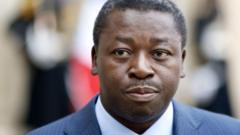Faure Gnassingbé has been sworn in to a newly created position in Togo's government, stirring controversy and concern among opposition groups. With no official term limits, the changes come after recent constitutional reforms that abolished presidential elections, effectively shifting the nation from a presidential system to a parliamentary one, leading critics to label it an "institutional coup."
Togo's New Constitutional Changes Raise Concerns Over Lifelong Rule

Togo's New Constitutional Changes Raise Concerns Over Lifelong Rule
Faure Gnassingbé's new role as "President of the Council of Ministers" may solidify his family's 58-year hold on power in Togo.
The new role places Gnassingbé in power indefinitely, with analysts suggesting that his authority is now more deeply entrenched than ever. His family has dominated Togolese politics for nearly six decades, with his father, Gnassingbé Eyadéma, ruling before him. The opposition contends that the reforms have been implemented to benefit Gnassingbé's prolonged rule. Togo's upcoming municipal elections will be the first to occur under this new constitutional framework. Despite previous resistance to these reforms, the government is pressing ahead, raising concerns about democracy and governance in the nation.



















